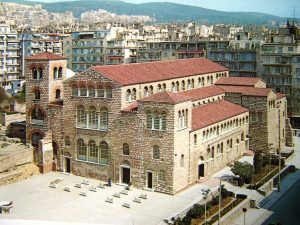Prepared by Harriet Aagard, National Library of Sweden, and Caroline Saccucci, Library of Congress
The Subject Analysis and Access Section was engaged in several sessions during the IFLA WLIC 2019 in Athens.
Satellite Meeting: Metadata Specialists in the Machine Age
The Bibliography, Cataloguing, Subject Analysis and Access, and IT Sections collaboratively organized an all-day satellite meeting, “Metadata Specialists in the Machine Age,” held at and sponsored by Aristotle University in Thessaloniki, on 22 August. Approximately 80 library professionals attended this event. The meeting, coordinated by Mélanie Roche (Cataloguing Section), included three 30-45 minute presentations with 45 minutes for discussion at each table after each presentation. In his presentation On the Automation of Subject Analysis and Access: Foundations, Requirements, Steps towards implementation, Andreas Oskar Kempf (Subject Analysis and Access Section) discussed the project he and his colleague Anna Kasprzik have been working on at ZBW – Leibniz Information Centre for Economics. Caroline Saccucci (Subject Analysis and Access Section) presented “Automagic” CIP Data at the Library of Congress with PrePub Book Link.” Finally, Tiphaine Cécile Foucher from the Bibliothèque nationale de France gave a recorded presentation What Does it Mean to be a Librarian in the Digital Age? Examples from data.bnf.fr, with Mélanie Roche providing more insight about this topic. At the end of the day, representatives from each table gave a summary of the discussions at their tables. The presentations were very well received and led to quite interesting discussions.
Presentations will be published at https://www.lib.auth.gr/en/iflawlic2019
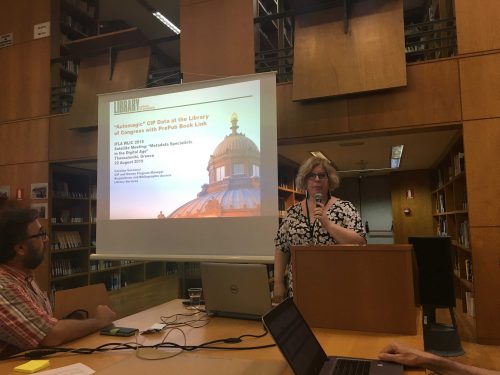
Caroline Saccucci
Open Session: Libraries, Archives and Museums in Dialogue
The Subject Analysis and Access Section together with the Art Libraries Section presented Open Session 206 Libraries, Archives and Museums in Dialogue: Improving Access to Complementary Collections, held on 28 August, 8:30-10:30 am. The goal of the open session was to demonstrate how libraries can improve subject access to collections and how new tools and technologies, linked metadata, and shared authority data enable librarians to support interlinking objects between different collections. Andreas Oskar Kempf, SAA, and Lucile Trunel, chair of the Arts Libraries Section, co-chaired the session, which over 120 delegates attended. The co-chairs kept the session on time with some time at the end for a few questions.
1. Not just art : the challenges and successes of integrating archival, library and image collections into an art focussed collection management system / Claire Eggleston, Art Gallery of New South Wales, Sydney, Australia
Paper in English
Translation: Español
2. Leveraging wikidata for descriptive cultural heritage metadata / Regine Heberlein, Princeton University Library, United States
Paper in English
3. Archives, museums and libraries: breaking the metadata silos /Richard Gartner, Warburg Institute, London, United Kingdom; Raphaele Mouren, Warburg Institute, London, United Kingdom
Paper in English
Translation: Español
4. Bringing Library and Museum Resources Together: How Can Artificial Intelligence Help (based on the Ivan Tsvetaev’s Book Collection Project)? / Ekaterina Igoshina, Pushkin State Museum of Fine Arts, Moscow, Russian Federation ; Juliya Dubrovskaya, Pushkin State Museum of Fine Arts Research Library, Moscow, Russian Federation
Paper in English
Translation: Español
5. Taking on the content discovery challenge: The NLB Case Study / Patrick Cher, National Library Board of Singapore, Singapore
Paper in English
6. Digital Library of the Artistic Production of ECA/USP /Francisco Carlos Paletta, University of Sao Paulo, Brazil ; Marina M. Macambyra, University of Sao Paulo, Brazil ; Sarah Lorenzon Ferreira, University of Sao Paulo, Brazil ; Vânia Mara Alves Lima, University of Sao Paulo, Brazil
Paper in English
7. Metadata Obscura: Refocusing digital collections through the lens of art history / Alia Levar Wegner, Miami University, Oxford, United States ; Stefanie Hilles, Miami University, Oxford, United States
Paper in English
Translation: Español
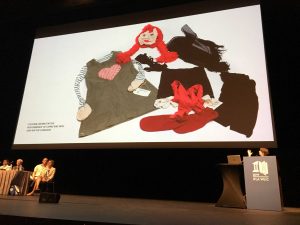
Claire Eggleston talks about the Art Gallery of New South Wales, Sydney, Australia
Division III Session: Library Services for a Multicultural World: with Special consideration to the Many Languages Involved
Each section within Division III was invited to give a lightning talk at this session.
From the Subject Analysis and Access Section, Andreas Kempf and Athena Salaba discussed the benefits with a using a controlled vocabulary when dealing with multicultural issues and biases in subject analysis.
After each of the sections had given a presentation, delegates at the tables discussed various questions posed by each of the speakers. Ligthning talk presentation
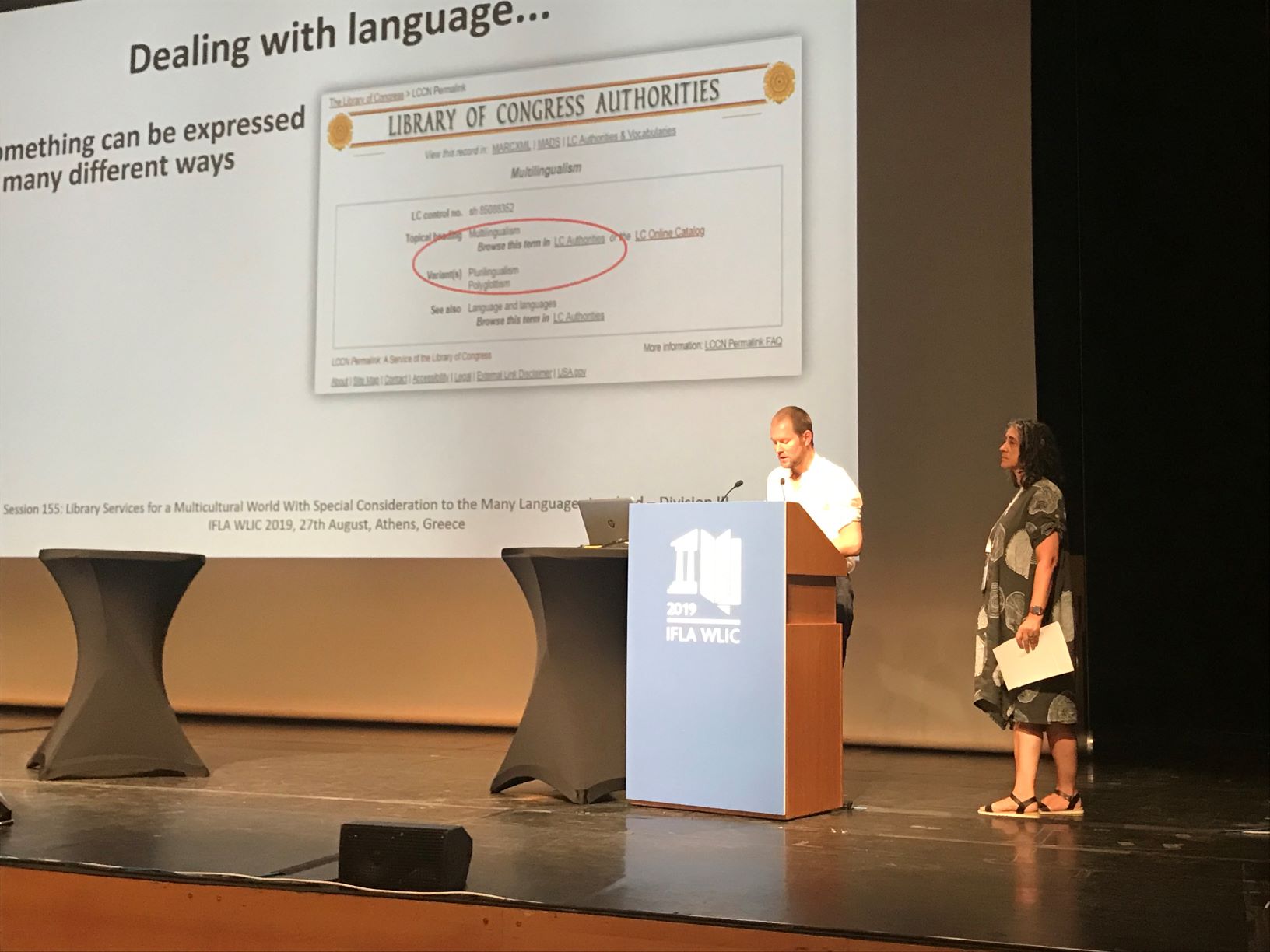
Andreas Kempf and Athena Salaba at the Division III open session
Metadata Reports Session
The Genre/Form Working Group
Ana Stevanovic reported that, after IFLA WLIC 2018 in Kuala Lumpur, the Genre/Form Working Group commenced an ongoing project to compile a list of vocabularies, thesauri, etc. related to genre/form concepts and to collect bibliographic references about genre/form topics. Compiled lists will be updated and published on WG web page regularly.
The Metadata Newsletter
Harriet Aagaard reported about the IFLA Metadata Newsletter – a collaboration between the three bibliographic sections: Bibliography, Cataloguing, and Subject Analysis and Access. Two issues are published every year in June and December. The newsletter is filled with information about the work of the sections, about metadata activities around the world, including meetings and conferences – everything that people with an interest in metadata would want to read! The Metadata Newsletter
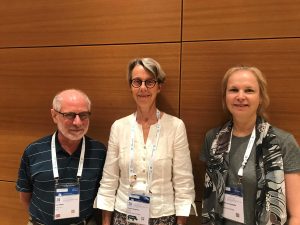
Jay Weits – Bibliograhy, Harriet Aagaard – Subject Analysis and Access, Marja-Liisa Seppälä – Cataloguing
The Automated Subject Analysis and Access Working Group
Harriet also presented the new working group Automated Subject Analysis and Access. The goal is to create a report that includes case studies of library projects using automated indexing and a literature review. More information will be published at the WG web page.
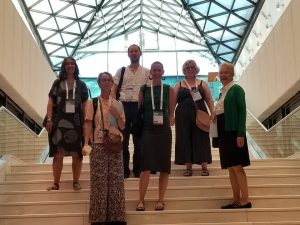
The Working Group on Automated Subject Analysis and Access





